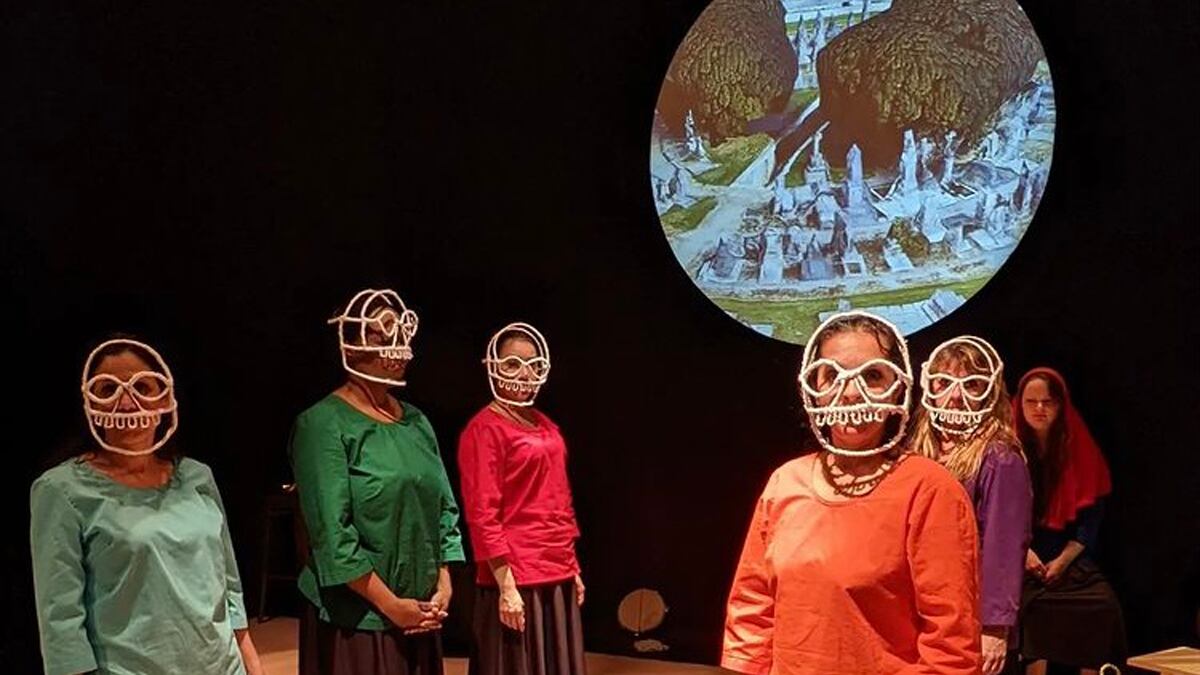Since the beginning of time, women from every culture and country have endured every form of violence possible and the erasure of their stories. It’s easy to live with atrocities when you choose not to think of them. Denial is a simple pill to swallow, even if that prescription proves lethal for others.
In the Name of Forgotten Women provides viewers an antidote by shining a light on a pathway to proactive action. The play, co-produced by CoHo Productions and Grito Poetry/Productions, is an 85-minute, two-act creation that is both a beautiful work of art and an eye-opening education.
A “choreopoem” billed as an attempt “to restore the Feminine in the world,” In the Name of Forgotten Women employs a variety of art forms simultaneously—live music, poetry, dance, singing and projections—to create a vibrant call to action. It recognizes we must first be willing to remember our history to reckon with the present.
A cast of seven women (Dre Slaman, Kristin Robinson, Mini Sharma-Ogle, Naiya Amilcar, Eleanor Amorós, Hannah Edelson and Melanie Moseley) executes that task brilliantly. The play first introduces Enheduanna (Slaman), the first known author of the world and a High Priest, who shares her story and aids in narration. With each cast member representing a different culture and country, they one by one disclose the seemingly endless ways that society has silenced them.
The production’s creative team worked with nine cultural consultants, each from a different country. Facts, laws and real-life news stories are incorporated throughout, such as 722 men in Brazil who claimed “defense of honor” as the justification for killing their wives.
In one scene, each cast member walks in a circle as they hold a photo of an actual woman who has gone missing in Argentina—and if you’re thinking North America is any better, think again. As a projected map shows uncountable red dots, the audience is asked, “Where are the missing and murdered Indigenous women?”
Playwright Cindy Williams Gutiérrez has waited years to see her vision for In the Name of Forgotten Women come to fruition. “I began to imagine this choreopoem over four years ago. I have kept the flames burning for this production for two years,” she tells WW, adding, “CoHo selected the play two years ago—just two weeks before COVID ‘struck’ the U.S.”
Even under the best of circumstances, pulling off a show is no easy task. Yet Gutiérrez never lost her motivation.
“My impulse for this work is, in a single word, embodiment. The body never lies. We hold pain in our bodies. We must move through pain to reclaim our power,” she says. To her, “it was not enough for these poems to exist in a collection. My body told me they needed to be embodied by seven diverse women. Their stories had to be told through their raised voices, luminous faces and tender bodies.”
Helping her bring this vision to life was director Gemma Whelan. “I see In the Name of Forgotten Women as a cry against forgetting,” she says. “The first author of the world, a Sumerian High Priest, summons women from around the globe and serves as a midwife to their stories of violence and oppression.”
While In the Name of Forgotten Women takes the injustices it confronts seriously, it is not without joy—and it refuses to let audiences passively accept the horrors it depicts. Whelan says she “would hope that audiences are moved by the stories of these women and feel challenged to stand up, to speak out, and to work on creating a better future where the life-giving power of the feminine is embraced and respected.”
That hope is part of what makes In the Name of Forgotten Women activist theater at its finest. As the audience was asked, “Where are the missing and murdered Indigenous women?” it turned into a chant. The chant transmuted into a mission: first remembrance, then recompense.
SEE IT: In the Name of Forgotten Women plays at CoHo Theater, 2257 NW Raleigh St., 503-220-2646, cohoproductions.org. 7:30 pm Wednesday-Saturday, 2 pm Sunday, through April 17. Pay what you can.
